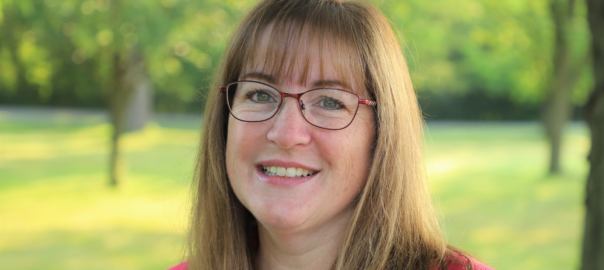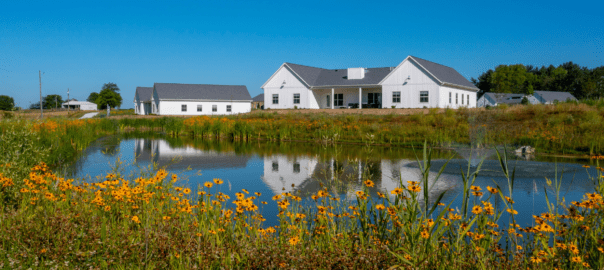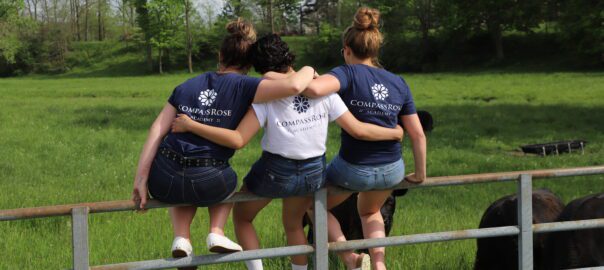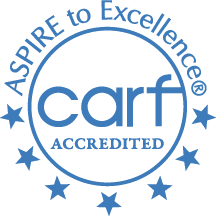Just before writing this, my husband, my dog, and I were all sitting outside. After laying in the sunshine for a while, our dog got too hot and went into the shade of our open garage. My husband then got her fresh water, which she drank immediately. He then reflected on the joy of being able to meet the need of an animal and that doing so is part of what we are called to as God’s children. Taking care of an animal brings life and a sense of purpose. Students at Compass Rose get to participate in this same God-given task through interacting with the therapy dogs on campus and with the horses at equine therapy.
At CRA, one of our core beliefs is that people are created for connection. Dogs are similar in that way. Ancestrally, they existed in packs, and therefore met the needs of their pack. Dogs were dependent on their pack to care for them, and, in turn, they protected the members of their pack. Petting a dog releases dopamine, a hormone responsible for feeling pleasure, and oxytocin, a hormone essential in building trust. Simultaneously, petting dogs also neutralizes cortisol, a hormone responsible for stress. As staff and students healthily relate to the dogs, and they to staff and students, a stronger connection of pleasure and trust is built.
CRA’s therapy dogs, Onyx, Opal, and Ruby, engage with students in group therapy, individual and family therapy, and in the home’s day-to-day activities. Students will often request a dog in the home or to be in a therapy session. In the home, students walk the dogs and play with them. Students experience great joy when the dogs wag their tails in excitement to see them. When in a therapy session, most often the dogs will lay down in the therapist’s office. Just knowing the dog is in the room can offer peace and comfort to a student. Other times, the dog will sense stress and will snuggle close to the student, and she will pet the dog as she needs comfort or out of happiness. As they use the dog to regulate their body and emotions, students can then ask for what they need relationally from staff and/or peers. Furthermore, if a student is not caring for the dogs well, staff can offer feedback and teach students how to do this in a mutually beneficial way.
Just about every morning, I get to hear the pitter-patter of a dogs’ feet coming down the hall to my office. Dopamine is activated, and I immediately feel excited to see them. I pet them, talk to them, perhaps even give them a treat. I also know that if ever I need to regulate, I can find them in the workroom where they are waiting to play fetch.
In addition to their interactions with the therapy dogs, students attend equine therapy once a week, though during the summer they attend more frequently. They are paired with a horse and are empowered to build a trusting relationship with their horse. Most students are disappointed to learn they will not actually ride the horse, mainly because students use ponies or mini-horses. While riding a horse is fun, it is not necessary for building trust in the therapeutic process. Instead, students are trained to feed, groom, and lead their horse in activities and obstacles. They are acting in their purpose to care for the animals. This allows students to overcome fear, develop confidence, and increase their self-esteem.
The human brain operates on “guilty until proven innocent.” This means the brain deems the world “unsafe” until it is able to create and maintain safety. The amygdala in the human brain is responsible for the Fight-Flight-Freeze response. Horses’ brains are similar. This makes the relationship between a horse and a student crucial. As a horse learns that the student is safe, they will have a solid foundation of trust, and both the horse’s and the student’s brain simultaneously learn they are mutually “not guilty.” As a student learns this with horses, she internalizes she can develop safety with human-human relationships. One exercise done with the horses specifically has the intent of building trust: picking up the horse’s hoof. Horses cannot see their feet, so to allow a student to do this is to trust that the student has the horse’s best interest in mind.
Horses also have an ability to mirror body language and even emotions. People do the same thing! A dysregulated adult cannot regulate a dysregulated child. However, by an adult regulating their body, a child will also “mirror” this via mirror neurons and regulate themselves. A horse can sense if a student is dysregulated. The horse and student will engage in activities in order to regulate together. Students describe horses as “a pal to talk to” in that the horse cannot talk back. The horse will not tell anyone the secrets that have been shared, but instead is a safe bouncing board for students.
The obstacles and activities instill confidence in the students and assist them in knowing how to set and maintain boundaries. Students often reflect on what they have learned in a boundaries-building exercise at equine therapy and apply it to their current peer-to-peer or familial relationships. Through equine therapy, they develop a sense of belonging, identity, and an ability to connect with others.
I even have a goldfish named Kevin in my office. Students talk to Kevin and, when feeling dysregulated, will watch him swim. One student has even cleaned his tank.
While I cannot speak to the extent of the therapeutic benefits of fish, I can further encourage the innate instinct to care for animals. Part of our purpose as humans is to care for creation. When students engage in animal-assisted therapy, it awakens that vocation within them. It calls them back to Eden. Whether it be a horse, a dog, the cows on campus, a goldfish, or another animal, students are giving care to something outside of themselves. They are tending to God’s creatures, and therefore, nurturing and healing their innermost being.
-By Compass Rose Academy Therapist Marissa Pollard, MA, LMFT, RPT

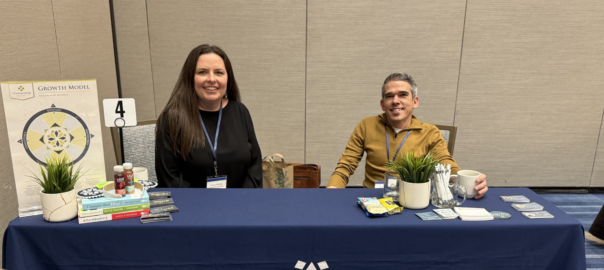




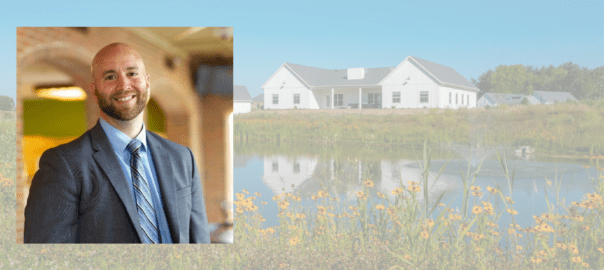
 Josiah White’s and Compass Rose Academy are excited to welcome Matthew Purkey as their new President and Chief Executive Officer. He replaces President & CEO Ron Evans, who will retire upon the transition after almost 6 years of service to the organization. Matthew will begin in his new role on October 2, 2023.
Josiah White’s and Compass Rose Academy are excited to welcome Matthew Purkey as their new President and Chief Executive Officer. He replaces President & CEO Ron Evans, who will retire upon the transition after almost 6 years of service to the organization. Matthew will begin in his new role on October 2, 2023.